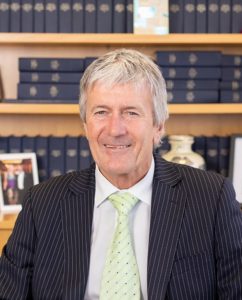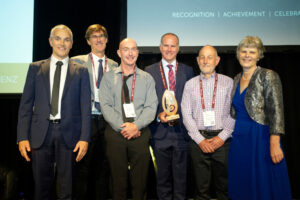It’s great to live in a country where, a few weeks after the general election, Prime Minister Jacinda Ardern has set out to deliver her government’s second-term policy programme after voters greatly increased her party’s seats in Parliament. This contrasts with the experience in the much bigger United States, where victory by the president-elect is not being acknowledged by the incumbent.
Donald Trump – alas – is no more able and/or willing to accept the official count of eligible votes cast than he is to accept the science around COVID-19 and climate change.
When Ms Ardern rejuvenated her cabinet (without the need to allocate jobs to MPs from a coalition party), she gave Damien O’Connor a bigger workload and more influence than he had previously. He has kept his job as Minister of Agriculture and picked up Trade and Export Growth (from David Parker) and Land Information (from Eugenie Sage). He keeps responsibility for Biosecurity and Rural Communities for good measure.
Some commentators say Mr Parker lost the trade job because of the need to keep him at home, where he has the important job – with huge implications for farmers, growers and ag/hort scientists – of overhauling the Resource Management Act.
 The Research, Science and Innovation portfolio remains with Megan Woods. She has given no indication of future plans or directions, except for remarks she made when she announced the Government’s investment of $84.7m through the Marsden Fund to support 134 new projects. These included the financial risks of climate change.
The Research, Science and Innovation portfolio remains with Megan Woods. She has given no indication of future plans or directions, except for remarks she made when she announced the Government’s investment of $84.7m through the Marsden Fund to support 134 new projects. These included the financial risks of climate change.
“We’ve designed our funding so it can address real-world problems, while also giving researchers the freedom to innovate and come up with new ways to solve problems,” Megan Woods said.
“Health issues like Alzheimer’s and Parkinson’s Disease are wide-ranging problems and require innovative thinking. We need to look at these issues from different angles to ensure that we are doing the best we can for the future of our country.
The full results and researcher contact details for media comment will be on the Royal Society Te Apārangi website www.royalsociety.org.nz.
Expanding our exports
 Trade Minister O’Connor on November 15 signed the Regional Comprehensive Economic Partnership (the RCEP), a trade agreement embracing 15 economies in the Asia Pacific region that take over half of New Zealand’s exports.
Trade Minister O’Connor on November 15 signed the Regional Comprehensive Economic Partnership (the RCEP), a trade agreement embracing 15 economies in the Asia Pacific region that take over half of New Zealand’s exports.
The agreement will secure market access for New Zealand exporters to a region which includes seven of New Zealand’s top 10 trading partners.
The other signatories are Ministers from ASEAN Member States, Australia, China, Japan, and South Korea.
Our primary industries are expected to profit from the agreement, which will provide more access to countries such as Indonesia and give more clarity around trade rules within the region.
The government expects Customs authorities will release perishable goods within six hours of arrival, as a result of the deal. This will help to reduce spoilage and save money. The meat industry will benefit from the elimination of tariffs on some meat products into Indonesia.
New Zealand exported over $36 billion of goods to RCEP countries and nearly $12 billion of services in the year ending December 31, 2019.
Mr O’Connor said the RCEP is projected to add $186 billion to the world economy. As a party to it, furthermore, New Zealand has a seat at the table of a globally significant regional economic agreement, providing the opportunity to cooperate on a broad range of economic and emerging issues.
This should shore up support for international trade rules which small countries like New Zealand rely on, at a time when protectionism around the world threatens to impede our export growth.
Trade surplus
The latest official stats for the year to 30 September 2020 show the country had its best goods trade surplus – $1.7 billion – since 2014, when dairy prices were very high. Imports, especially of fuel and cars, fell sharply in the wake of the government’s response to COVID-19 while exports held up well despite the pandemic.
The increase in annual exports was led by milk powder, butter, and cheese (up $1.4 billion), beef (up $433 million), and gold kiwifruit (up $377 million). New Zealand also exported more breathing equipment, which is in high demand worldwide because of COVID-19.
For most of the past 20 years, New Zealand had a goods trade shortfall, importing much more than it exports.
Prospects for future export growth were enhanced by spring rain – at the 11th hour, in effect – after an ominously dry October. Farmers were a little more relaxed, therefore, heading into summer (although Napier got a bit more than needed).
Farmers have been banking on La Niña, and it looks like it may have arrived earlier than expected. The rain will ensure farmers could grow quality feed going into summer.
Award winners
 NZIAHS congratulates, Dr John Caradus, an Honorary Fellow, who has been awarded the RSNZ 2020 Thomson Medal by the Royal Society Te Apārangi for his leadership in the commercial delivery of plant and microbial technologies to farmers from both publicly and privately funded research, and for improving pastoral sector productivity.
NZIAHS congratulates, Dr John Caradus, an Honorary Fellow, who has been awarded the RSNZ 2020 Thomson Medal by the Royal Society Te Apārangi for his leadership in the commercial delivery of plant and microbial technologies to farmers from both publicly and privately funded research, and for improving pastoral sector productivity.
John has spent his whole career focused on improving the value of grasslands for New Zealand farmers. This started with his successful application for a forage plant breeding position at DSIR Grasslands.
He completed a PhD at the University of Reading (UK) and with the establishment of AgResearch in 1992 he became the Team Leader of the white clover breeding team. He later became a Science Group Leader and then Science General Manager, before leaving AgResearch and moving to Dexcel (now DairyNZ) as CEO in 2003.
John was appointed CEO of Grasslanz Technology in 2006, allowing him to combine his strong research background with the opportunity to direct R&D investment in developing research outputs and ensuring that they are commercially delivered as technologies that can be used by farmers.
As a plant breeder he was involved in developing 16 white clover cultivars. More recently he has been recognised for his understanding of the area of Epichloë grass endophytes, a fungal symbiotic partner of grass that can protect it from insect pests.
He was part of the AgResearch team led by Dr David Hume that was awarded the2018 Pickering Medal by Royal Society Te Apārangi for work to discover, patent and commercialise the novel rye grass endophyte AR37.
John is a prolific writer with over 250 science publications, with over 100 of these being in national or internationally peer reviewed journals.
 Our congratulations go to Plant & Food Research soil scientist Dr Trish Fraser who has received the 2020 Women of Influence Award (Rural Category). This was in recognition of her three decades of dedication and contributions to the rural sector and rural community. The judges praised her collaborative approach and her rare skill of communicating science to farmers.
Our congratulations go to Plant & Food Research soil scientist Dr Trish Fraser who has received the 2020 Women of Influence Award (Rural Category). This was in recognition of her three decades of dedication and contributions to the rural sector and rural community. The judges praised her collaborative approach and her rare skill of communicating science to farmers.
Dr Fraser has made significant contributions to soil science and the New Zealand primary industries by working closely with the cropping sector to understand the interactions among soils, crops and the environment. She has influenced the direction of soil science particularly in the field of soil health, invested heavily in the development of other researchers, actively participated in the scientific community through professional societies and led the way in communicating science to farmers and rural professionals.
She has been at the fore of research addressing a wide range of soil-related issues in the cropping sector, much of which has delivered practical knowledge to the farming community to balance important productivity, environmental and system resilience outcomes. She has been part of several collaborative research and industry teams that are responsible for key discoveries in soil health.
 Plant & Food Research has also won a Primary Industry Award recognising innovations in orchard design. The Future Orchard Planting Systems (FOPS) science team received the Primary Industry Science and Research Award in recognition of their work in creating a new growing system that increases the productivity potential of New Zealand’s apple, pear and summerfruit orchards.
Plant & Food Research has also won a Primary Industry Award recognising innovations in orchard design. The Future Orchard Planting Systems (FOPS) science team received the Primary Industry Science and Research Award in recognition of their work in creating a new growing system that increases the productivity potential of New Zealand’s apple, pear and summerfruit orchards.
“The FOPS design, led by Dr Stuart Tustin, was based on our understanding of plant physiology and developmental biology,” says Dr Jill Stanley, Science Group Leader at Plant & Food Research.
“Theoretically we knew it was possible to increase the light captured by the canopy and that this would greatly increase productivity”.
In the FOPS system, the three dimensional orchard design is replaced by a two dimensional canopy with row spacing reduced to two metres. This intercepts more light and has more than doubled the yield of high quality fruit. The design has other benefits too. It improves access, making orchard management simpler which will enable future innovations in automation and robotic picking. Apple orchards were used as the model system but FOPS has also been adapted for pear, cherry and apricot orchard designs.
Another scientist, Siouxsie Wiles, was named the supreme winner of the 2020 Stuff-Westpac Women of Influence Awards. Dr Wiles is an Associate Professor and head of the Bioluminescent Superbugs Lab at the University of Auckland.
The judges said her accessible and evidence-led commentary about staying safe during the Covid-19 pandemic helped ease the nation’s anxiety and became the basis for World Health Organisation communications tools.
Dr Wiles was also awarded the science and health innovation award.
The Women of Influence Awards, jointly presented by Westpac NZ and Stuff, had 339 nominations across ten categories this year.













